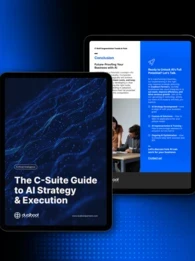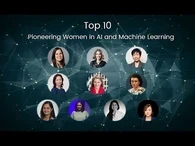The phrase “AI agent” still brings to mind chatbots handling customer queries. Fast forward to today - AI agents are far more versatile, representing a new generation of systems capable of perceiving, reasoning, and acting autonomously. These bots are beginning to reshape how enterprises operate, not just in customer service but across software development, data analytics, and operational workflows.
In this episode of Tech Transformed, Dare To Data Founder Christina Stathopoulos explores the rapid rise of AI agents with Ben Gilman, CEO of Dualboot Partners. Together, they unpack how AI agents differ from traditional automation and what this shift means for software development, enterprise operations, and the future of productivity.
AI Agents vs. Traditional Automation
Unlike traditional automation, which follows strict, deterministic rules, AI agents can adapt to changing inputs, analyze complex data sets, and make autonomous decisions within defined parameters. This allows them to tackle tasks that were previously too intricate or time-consuming for automated systems. Dualboot Partners helps organizations harness these AI agents, integrating them into workflows to deliver real business value through a combination of product, design, and engineering expertise.
“The biggest difference with an AI agent, between a standard tool, is that the agent can perceive information and reason about it, providing context and insights you don’t normally get in an algorithm.” — Ben Gilman, CEO, Dual Boot Partners.
The Future of AI in Enterprise
Organisations face several hurdles when integrating AI agents, including defining clear use cases, understanding the probabilistic nature of AI reasoning, and incorporating agents into existing processes and workflows. Despite the challenges, the potential payoff is substantial. AI agents can boost productivity, improve decision-making, and make enterprises more agile. As these systems mature, humans and AI are increasingly collaborating as true partners, reshaping what the workplace and work itself look like.
Takeaways:
- AI Agents vs. Traditional Automation: AI agents can perceive and reason, offering more context and adaptability compared to deterministic systems.
- Real-World Applications: Examples include virtual vet agents and data analytics tools that enhance productivity and decision-making.
- Challenges in Adoption: Organizations face hurdles in defining specific use cases and integrating AI agents effectively.
- Future of AI in Tech: AI agents are expected to significantly boost productivity and innovation in software development and enterprise operations, with AI-first approaches like Dualboot's "DB90" driving structured adoption and accelerating modernization.
Chapters
0:00 - 3:00: Introduction to AI Agents
3:01 - 6:00: Differences from Traditional Automation
6:01 - 12:00: Real-World Applications and Examples
12:01 - 18:00: Challenges in Adoption
18:01 - 22:00: Future Impact on Tech and Operations
22:01 - 24:00: Conclusion and Final Thoughts
Rewriting Enterprise AI Strategy
Shift AI from scattered pilots to a board-directed agenda that ties investment to measurable value and long-term competitive positioning.

About Dualboot Partners
Dualboot Partners is a product-led digital transformation company that builds powerful software designed to drive business results. With a proven AI-driven process, Dualboot combines product strategy, design, and engineering to help organizations modernize systems, accelerate delivery, and create scalable solutions. The company’s diverse team partners with clients across healthcare, financial services, technology, manufacturing, consumer markets, and more. Dualboot is recognized for technical excellence, clear communication, and a focus on outcomes that strengthen the bottom line.









Comments ( 2 )
Ben Gilman
16/09/2025
Trisha Pillay
16/09/2025